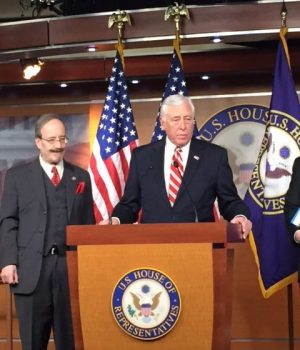Hoyer: bill would require Congressional approval for Russia sanctions relief
WASHINGTON – House Minority Whip Steny Hoyer (D-Md.) has introduced bipartisan legislation that would limit the ability of President Donald Trump to remove sanctions imposed on Russia.
“Today we are introducing bipartisan legislation to ensure that Russia does not receive any sanctions relief until it earns it,” Hoyer said at a news conference on Wednesday morning accompanied by fellow Congressional Democrats.
Republican Congressmen Tom Rooney (Fla.), Adam Kinzinger (Ill.) and Mike Turner (Ohio) have signed on as cosponsors of the bill but were not present at the news conference.
Hoyer said the legislation does not yet have the support of Congressional Republican leaders.
House Speaker Paul Ryan (R-Wis.) on Wednesday suggested he would support Congressional action in the event President Trump opted to provide Russia sanctions relief.
“If those sanctions were to be watered down, I would, for sure, support codifying them and making sure they don’t get watered down,” Ryan told MSNBC’s “Morning Joe.”
The Russian Sanctions Review Act “would require a 120-day review period before the President may waive, suspend, reduce, provide relief from, or otherwise limit the application of sanctions with respect to the Russian Federation.”
Companion legislation has been introduced in the Senate by Republicans Lindsey Graham (S.C.), John McCain (Ariz.), Marco Rubio (Fla.) and Democrats Ben Cardin (Md.), Sherrod Brown (Ohio) and Claire McCaskill (Missouri).
Both Democrats and Republicans criticized Trump as a candidate for praising Russian President Vladimir Putin. Trump also has been criticized for his close business ties with Russia.
The introduction of the legislation comes two days after National Security Adviser Michael Flynn resigned. His resignation was preceded by an apology to Trump and Vice President Mike Pence for misleading them about his phone conversation with Russian Ambassador Sergey Kislyak.
The Washington Post on Monday reported that then-acting-Attorney General Sally Yates three weeks earlier warned the White House that Flynn was vulnerable to Russian blackmail due to media reports claiming the retired lieutenant general gave Kislyak the impression that the incoming Trump team might be amenable to lifting economic sanctions that were imposed on Russia by the U.S. and the E.U. following Moscow’s 2014 annexation of the Crimea from neighboring Ukraine.
Then-President Barack Obama in his final weeks in office issued additional sanctions against Moscow after evidence showed that Putin interfered in the U.S. presidential election to undermine the candidacy of Democrat Hillary Clinton.
Flynn’s decision to engage Moscow prior to Trump assuming office raises questions as to whether the retired lieutenant general violated the Logan Act, a 1799 statue that prohibits unauthorized persons from diplomatically engaging foreign governments.
On Jan. 13, then-Trump transition team spokesperson Sean Spicer told reporters that the late December Flynn-Kislyak phone conversation was merely an informal courtesy call.
Flynn’s spokesperson told The Washington Post on Thursday that the retired lieutenant general does not recall discussing the possibility of lifting sanctions during the call but also said the prospect that such a conversation had occurred could not be ruled out.
A Russian government spokesperson told CNN on Friday that Flynn and Kislyak did not discuss sanctions during the call.
This article was republished with permission from Talk Media News

Bryan is an award-winning political journalist who has extensive experience covering Congress and Maryland state government. His work includes coverage of the election of Donald Trump, the confirmation hearings of Supreme Court Justice Brett Kavanaugh and attorneys general William Barr and Jeff Sessions-as well as that of the Maryland General Assembly, Gov. Larry Hogan, and the COVID-19 pandemic.
Bryan has broken stories involving athletic and sexual assault scandals with the Baltimore Post-Examiner.
His original UMBC investigation gained international attention, was featured in People Magazine and he was interviewed by ABC’s “Good Morning America” and local radio stations. Bryan broke subsequent stories documenting UMBC’s omission of a sexual assault on their daily crime log and a federal investigation related to the university’s handling of an alleged sexual assault.

